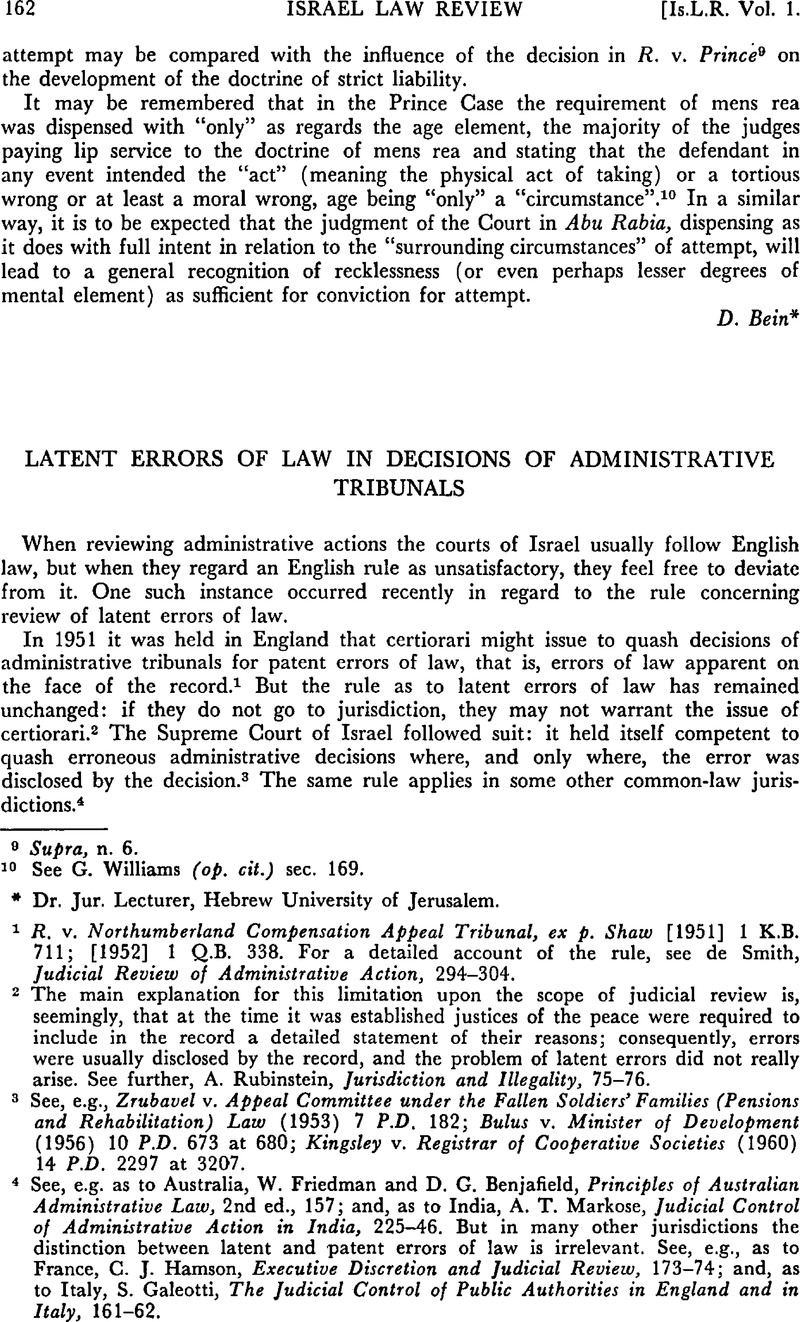No CrossRef data available.
Published online by Cambridge University Press: 12 February 2016

1 R. v. Northumberland Compensation Appeal Tribunal, ex p. Shaw [1951] 1 K.B. 711; [1952] 1 Q.B. 338. For a detailed account of the rule, see de Smith, Judicial Review of Administrative Action, 294–304.
2 The main explanation for this limitation upon the scope of judicial review is, seemingly, that at the time it was established justices of the peace were required to include in the record a detailed statement of their reasons; consequently, errors were usually disclosed by the record, and the problem of latent errors did not really arise. See further, Rubinstein, A., Jurisdiction and Illegality, 75–76.Google Scholar
3 See, e.g., Zrubavel v. Appeal Committee under the Fallen Soldiers' Families (Pensions and Rehabilitation) Law (1953) 7 P.D. 182; Bulus v. Minister of Development(1956) 10 P.D. 673 at 680; Kingsley v. Registrar of Cooperative Societies (1960) 14 P.D. 2297 at 3207.
4 See, e.g. as to Australia, Friedman, W. and Benjafield, D. G., Principles of Australian Administrative Law, 2nd ed., 157Google Scholar; and, as to India, Markose, A. T., Judicial Control of Administrative Action in India, 225–46Google Scholar. But in many other jurisdictions the distinction between latent and patent errors of law is irrelevant. See, e.g., as to France, Hamson, C. J., Executive Discretion and Judicial Review, 173–74Google Scholar; and, as to Italy, Galeotti, S., The Judicial Control of Public Authorities in England and in Italy, 161–62Google Scholar.
5 The duty imposed by the English Act is limited to tribunals therein specified (see sec. 12). The Israeli Law, on the other hand, prescribes the duty in general terms: “where application has been made in writing to a public servant [including, by definition, a statutory tribunal], to exercise any power conferred on him by law and he refuses the application, he shall notify the applicant, in writing, of the reasons for the refusal” (sec. 2). This duty is subject to a few exceptions only. See, on this Law, Pelley-Karp, J., “The Israeli Statement of Reasons Act, 1958” (1963) 12 Am. J. of L. 72–81CrossRefGoogle Scholar.
6 This, of course, does not apply where the law provides for an appeal, in which case the court may inquire into latent as well as patent errors of law. The Tribunals and Inquiries Act, 1958, has considerably increased the number of tribunals whose decisions are subject to an appeal to the High Court. In Israel there is no general provision as to appeals from decisions of administrative tribunals, though in many cases statutes establishing tribunals specifically provide for such an appeal.
7 R. v. Northumberland Compensation Appeal Tribunal, ex p. Shaw [1952] 1 Q.B. 338 at 346.
8 Administrative Law, 74.
9 (1963) 17 P.D. 2503.
10 It was argued by the respondent that the applicants had no standing in the matter, but the argument was rejected by the court.
11 The Courts Law, 1957, provides in sec. 33(b): “A precedent established by the Supreme Court binds every Court, except the Supreme Court.” And see, Dror, Y., “Some Recent Developments of the Doctrine of Precedent in Israel” (1958) Scripta Hierosolymitana, vol. V, pp. 228–44Google Scholar.
12 At p. 2516.
13 However, it remains to be seen whether the court will in every case be ready to examine any latent error allegedly made by a tribunal.
14 On the use of the declaratory judgment as a substitute for certiorari, see Zamir, I., The Declaratory Judgment, 96–101, 154–72Google Scholar.
15 In Lee v. The Showmen's Guild of Great Britain [1952] 2 Q.B. 329, 346, Denning L. J. said obiter that declaratory relief “is not subject to the limitation that the error must appear on the face of the record.” See further, Zamir, op. cit., 160–66. But see de Smith, op. cit., 409–11.